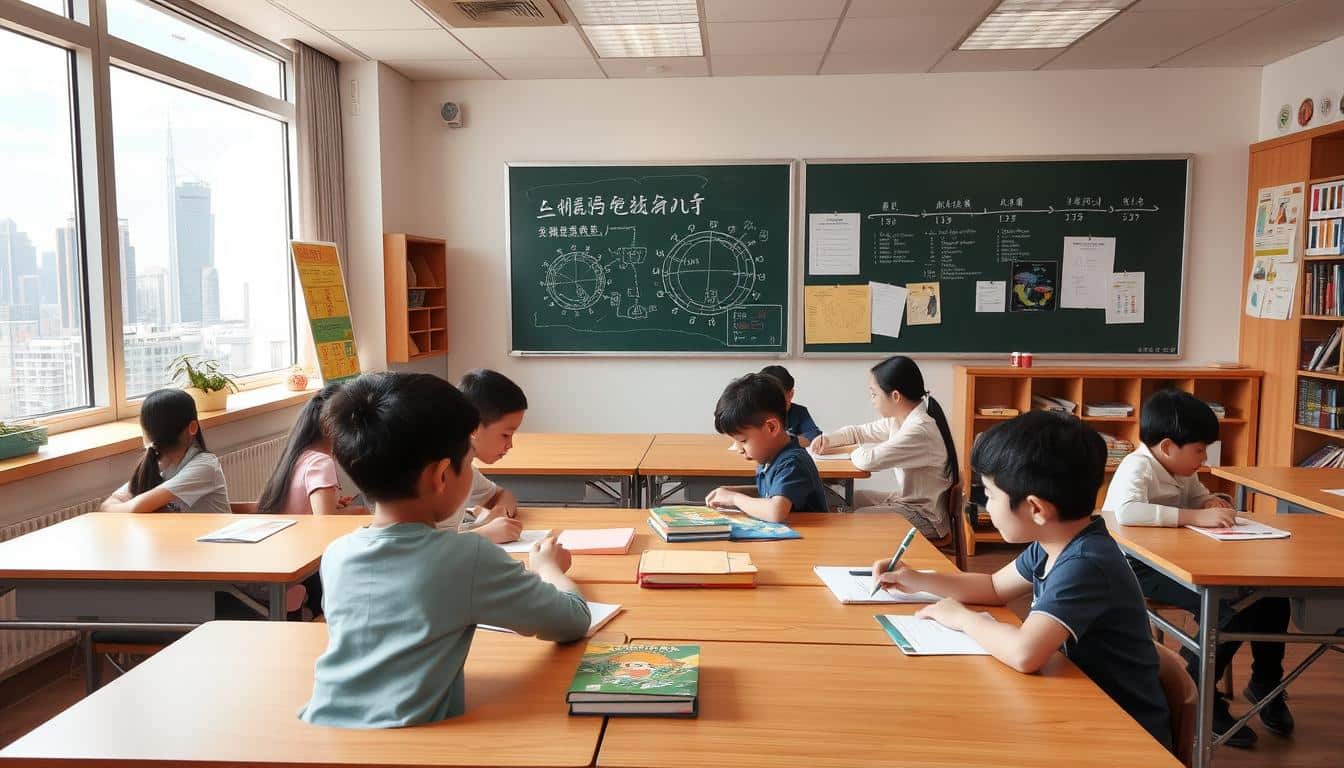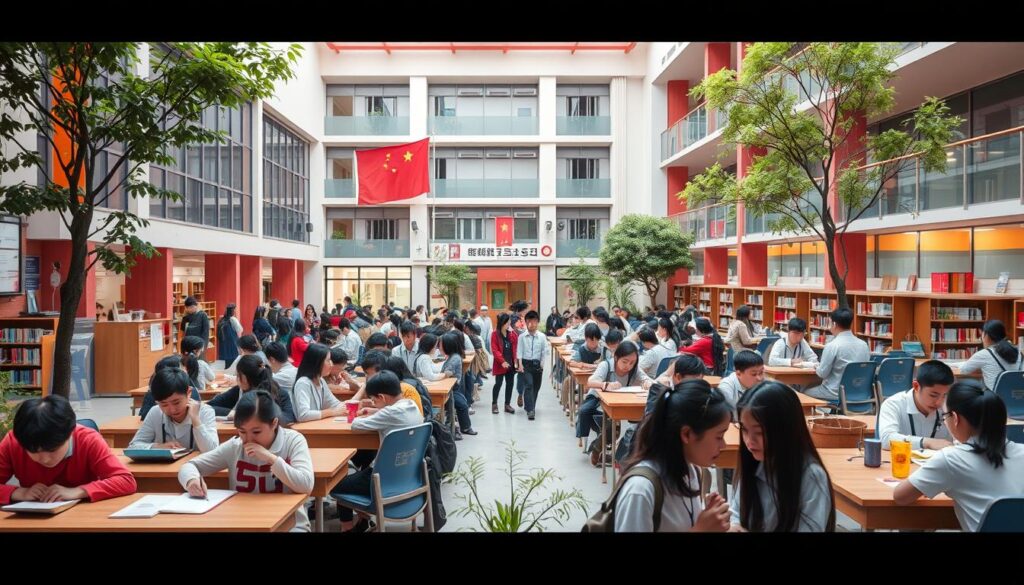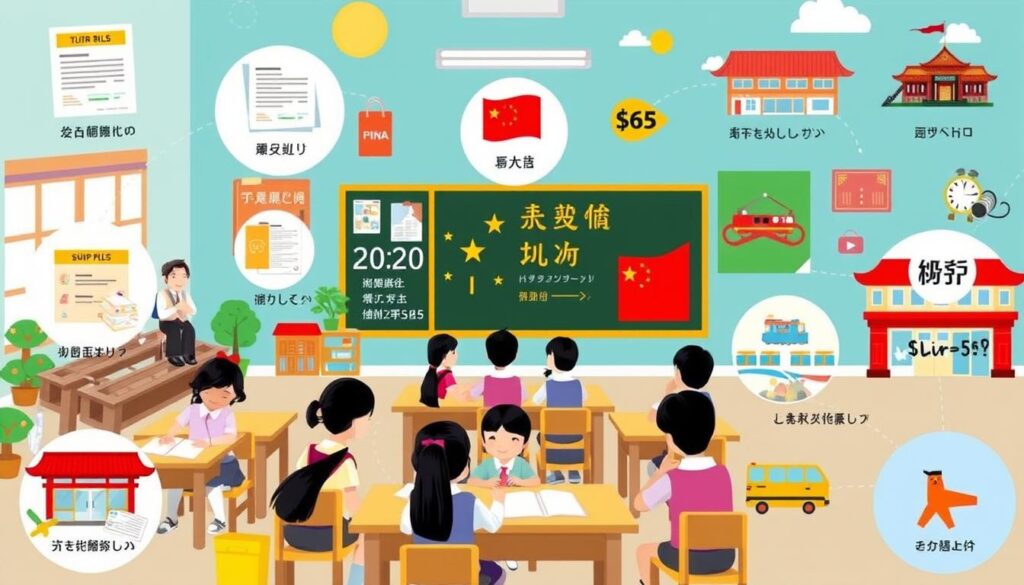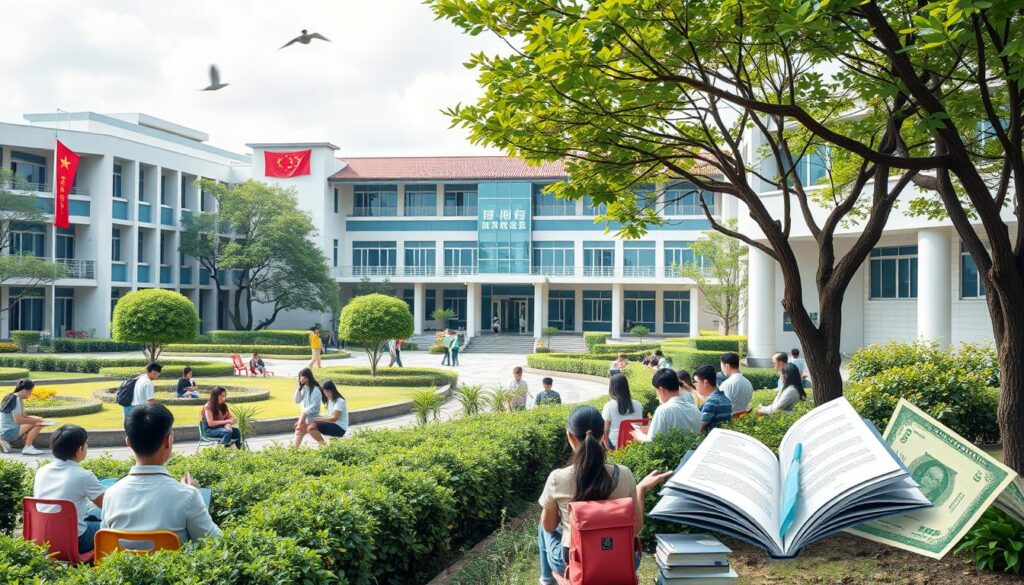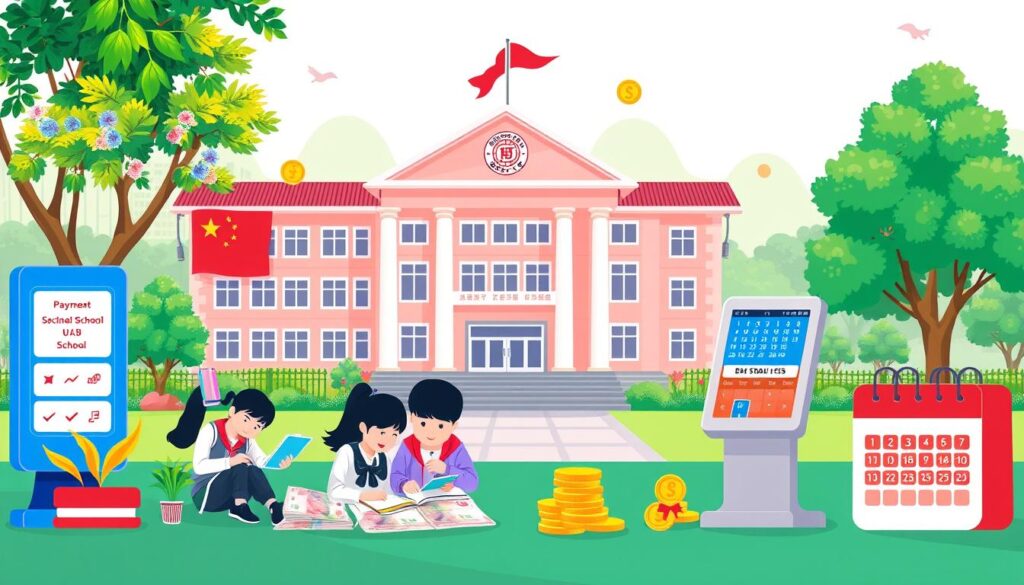As an expat parent in China, getting your child a top-notch education is key. Chinese international schools provide a world-class learning experience. But, it’s crucial to know the costs involved. Tuition fees for international schools in China vary a lot. This depends on location, curriculum, and facilities. This article will dive deep into Chinese international school fees, helping you understand the financial side of your child’s education.
The Chinese International School (CIS) in Hong Kong is a top choice for expat families. It has over 1,500 students, from Reception to Year 13. Tuition costs for expat children at CIS include annual fees, capital levies, and more. These costs can be a big investment in your child’s future.
A survey by ECA International shows China is the priciest for international school tuition fees at the secondary level. In Shanghai, tuition can be from 137,800 RMB to 267,332 RMB. Other costs like application fees, deposits, and uniforms also add up. These extra costs make up the overall Chinese private school expenses.
Key Takeaways
- Chinese international school fees vary based on location, curriculum, and facilities
- Tuition costs for expat children include annual fees, capital levies, and other expenses
- China is the most expensive country for international secondary school education
- Application fees, deposits, uniforms, and other costs contribute to overall expenses
- Financial aid and scholarships may be available for qualifying families
Understanding the Cost of Chinese International Schools
Thinking about a Chinese international school for your child? It’s key to know the costs. Bilingual education costs change a lot. This section will cover tuition and extra expenses at Chinese international schools.
Tuition Fees for Chinese International Schools
Tuition at Chinese international schools varies. It can be from RMB 210,000 to RMB 262,500 yearly, based on grade. For example, in Shanghai, here are the fees:
- Early Years and Pre-Kindergarten: RMB 210,000
- Kindergarten–Grade 5: RMB 245,000
- Grades 6–12: RMB 262,500
Some schools also ask for a capital fee or a seat deposit. For example, in Beijing, there’s a capital fee of RMB 30,000 and a deposit of RMB 20,000.
Additional Costs to Consider
There are more costs besides tuition. These include:
- Application fee: Around RMB 3,000
- Bus transportation fees: RMB 18,000 to RMB 21,000 yearly, based on zone
- English Support to Speakers of Other Languages (ESOL) fee: Approximately RMB 15,000
- Uniforms, textbooks, and school supplies
- Extracurricular activities and school trips
Some schools offer discounts for siblings. For example, one school gives a 5% discount on tuition for three or more siblings.
When looking at Chinese immersion programs and international school costs, think about the education value. The costs are high, but a quality bilingual education is worth it for your child’s future.
“Choosing a Chinese international school is a significant investment in your child’s future. It’s essential to carefully consider the costs and weigh them against the potential benefits of a bilingual education.”
Knowing the tuition and extra costs helps you choose the best Chinese international school for your child.
Factors Influencing Chinese International School Fees
Many things affect how much international schools in China charge. These include where the school is, its facilities, what it teaches, and the quality of its teachers. Knowing these can help families plan their education costs better.
Location and Facilities
The place of an international school can change its fees a lot. Schools in big cities like Beijing and Shanghai cost more because of higher living costs and demand. The quality of facilities also matters. Schools with the best classrooms and sports areas charge more to keep these up.
Curriculum and Programs Offered
The type of education a school offers also affects its fees. Schools with well-known programs like the International Baccalaureate (IB) charge more. This is because of the costs of these programs. Schools with lots of extra activities and language programs also charge more for these opportunities.
| Curriculum | Percentage of International Schools Offering |
|---|---|
| International Baccalaureate (IB) | 45% |
| Advanced Placement (AP) | 30% |
| A-Levels | 25% |
Faculty and Staff Quality
The quality of teachers at a school can also raise its fees. Schools with top teachers and a good student-to-teacher ratio charge more. This is because they pay their teachers well to ensure quality education.
Expatriate families need to think about these factors when looking at school fees. By understanding what affects costs, they can make choices that fit their budget and educational goals.
Comparing Fees Across Chinese International Schools
When looking at chinese international school fees, it’s key to compare costs across different schools. China has some of the priciest international schools in Asia. Cities like Beijing, Shanghai, Shenzhen, and Guangzhou have the highest fees. But, there’s a wide range of costs to consider.
Let’s dive into the international school tuition fees in China. Below is a table showing annual tuition fees for well-known Chinese international schools at different grade levels:
| School Name | Location | Kindergarten | Primary | Secondary |
|---|---|---|---|---|
| International School of Beijing | Beijing | ¥208,100 | ¥254,100 | ¥282,700 |
| Shanghai American School | Shanghai | ¥223,800 | ¥250,800 | ¥269,400 |
| Shenzhen American International School | Shenzhen | ¥158,000 | ¥188,000 | ¥218,000 |
| Guangzhou Nanfang International School | Guangzhou | ¥150,000 | ¥180,000 | ¥210,000 |
The table shows that chinese private school expenses can differ a lot. It’s important to remember that these figures are just for tuition. Other costs like application fees, uniforms, and meals are not included.
When planning for international school expenses in China, add 10-20% to the tuition fees for other costs. Some schools offer financial aid and scholarships to help with the costs of international education.
Investing in a child’s education is a crucial decision. The costs of international schools in China might seem high, but the benefits of quality education are worth it.
For families looking for help with Chinese international school fees and admissions, GETUTOR’s Free Matching Service for International School Private is a great resource. It connects families with experienced tutors who know the challenges and opportunities of international education in China. This support helps students succeed academically and personally.
Tuition Fee Structures in Chinese International Schools
When looking into Chinese international schools, knowing the tuition fees is key. These schools offer different payment plans like annual, semester, or monthly fees. This helps meet the financial needs of expat families. Let’s look at the common fee structures and how they affect international school tuition fees and tuition costs for expat children.
Annual Fees
Many schools ask for annual tuition fees upfront. This can save money compared to semester or monthly payments. For example, WISS in Shanghai charges 267,332 RMB per year for Years 12-13. Paying annually can save money and help the school financially.
Semester Fees
Some schools let you pay by semester, making it easier than annual payments. They split the year into two or three semesters. For instance, WISS tuition is 137,800 RMB per semester, totaling 275,600 RMB for the year. Semester payments offer flexibility but may not have the same discounts as annual payments.
Monthly Fees
Monthly payment options are rare but exist in some schools. However, they’re not common due to administrative issues. Monthly payments can help spread out costs but may include extra fees or higher costs than annual or semester payments.
Recent surveys show about 78% of Chinese international schools require annual payments. Around 20% offer semester payments, and only 2% have monthly plans.
Choosing a Chinese international school means understanding their tuition fees and payment options. Think about your family’s budget to pick the best payment plan. Remember, annual payments often save the most money on tuition costs for expat children.
Knowing about the different tuition fee structures helps expat families plan better for their children’s education. Whether you choose annual, semester, or monthly payments, investing in quality education is worth it for your child’s future.
Additional Costs Associated with Chinese International Schools
When planning for their children’s education in China, expatriate families face more than just tuition fees. These international school admissions costs include various other expenses. It’s important for parents to include these costs in their budget to avoid surprises.
Application and Registration Fees
Before getting a spot at a Chinese international school, families must pay application and registration fees. These fees range from 2,000 to 3,500 RMB for application. Registration fees can be higher, sometimes requiring a deposit of 10,000 to 75,000 RMB. These fees are non-refundable and separate from tuition.
Uniform and School Supplies
Students at many Chinese international schools must wear uniforms. This can cost between 1,000 to 4,120 RMB per year, depending on the school. Parents also need to budget for school supplies, textbooks, and other materials, adding several thousand RMB to the annual expenses.
Transportation and Meal Plans
Transportation and meal plans are big costs for families. Bus services can cost between 12,500 and 19,440 RMB per year. School meals, if not included in tuition, cost between 25 to 35 RMB per day.
| Additional Costs | Range (RMB) |
|---|---|
| Application Fees | 2,000 – 3,500 |
| Registration Fees (Deposit) | 10,000 – 75,000 |
| Uniforms (Annual) | 1,000 – 4,120 |
| Transportation (Annual) | 12,500 – 19,440 |
| School Meals (Per Day) | 25 – 35 |
Expatriate families must carefully review all the fees and costs for their child’s education in Chinese international schools. This ensures they can budget well and make the best choice for their child’s education.
Financial Aid and Scholarships for Chinese International Schools
Expatriate families in China often worry about the high international school tuition fees. But, many Chinese international schools offer financial aid and scholarships. These help make quality education more affordable.
In Hong Kong, scholarships can cover 10% to 100% of tuition fees. Schools like Kellett School and Harrow International School offer entrance bursaries. These cover tuition, IT equipment, extracurricular activities, transportation, and uniforms.
Financial aid is available for families in need at schools like Chinese International School (CIS) and English School Foundation (ESF). The application process requires detailed information about parents’ income and assets. This helps the school decide how much support to offer.
It’s crucial for expatriate families to check each school’s specific requirements and deadlines. This ensures they meet the necessary criteria for financial aid.
“We believe that every child deserves access to a world-class education, regardless of their financial background. Our scholarship and financial aid programs aim to make that possible.” – Jane Smith, Admissions Director at a leading Chinese international school
Some notable scholarship programs include:
- The SCIS International Scholars Program, offering six diverse scholarships for students in Grades 5-11, with amounts ranging from 25-75% of the annual tuition fee.
- BCIS scholarships for Grades 9-12, including Future Leaders, APEX Innovators, Academic, and Merit Scholarships, available to both Chinese and international students.
| Scholarship Program | School | Grades | Scholarship Amount | Application Deadline |
|---|---|---|---|---|
| International Scholars Program | SCIS | 5-11 | 25-75% of annual tuition fee | December 22, 2023 |
| Future Leaders, APEX Innovators, Academic, and Merit Scholarships | BCIS | 9-12 | 50-100% of tuition fees | June 21 (external applicants) |
To apply for scholarships, students may need to write essays, get teacher recommendations, and present portfolios. They also might have to go through interviews with the school’s scholarship committee. Scholarships are usually renewed each year, as long as the student keeps up with the program’s standards.
Exploring financial aid and scholarships at Chinese international schools can help expatriate families manage education expenses. This way, they can give their children the best education in China.
Payment Options and Deadlines for Chinese International School Fees
Parents have a few ways to pay international school tuition fees in China. Most Chinese international schools ask for the whole year’s fees upfront. This can be a big expense for families. But, some schools give discounts for early payment or let you pay by semester to make it easier.
Upfront Payment Discounts
Paying Chinese international school fees all at once can save money. For example, Western International School of Shanghai (WISS) gives a 3% discount for paying the whole year upfront. This can save a lot for families with kids in school. It’s a good idea to ask about these discounts when looking at international school tuition fees.
Payment Plans and Installments
Some schools offer payment plans for families who can’t pay the whole year upfront. These plans split the fees into two or three parts, due at the start of each semester. While you might not get the same discounts, it helps with budgeting.
Knowing the payment deadlines is important to avoid extra fees or losing your spot. If you enroll late, like after October 1st, you might pay more. You could pay up to 10% of the annual fee, even if it’s just for a few days.
LIS Chengdu, for example, charges an interest of 1.5% on the second installment of fees, payable with the first installment, and imposes a 5% surcharge on overdue payments.
When planning for Chinese international school fees, remember to include extra costs. These can include application fees, deposits, and lunch fees. These add up fast, so knowing the total cost is key when deciding to enroll.
The Impact of Exchange Rates on Chinese International School Fees
Exchange rates can greatly affect the cost of international school tuition for families in China. When the Chinese renminbi (RMB) value changes, so does the cost of school fees in other currencies like the US dollar or British pound.
For instance, the US dollar’s value against the renminbi has been rising since January 14. It now stands at $7.3, with a slight drop in July. This means that the cost of studying abroad can go up a lot. For example, if tuition was $30,000 at the start of the year, it would now cost an extra ¥18,000.
Let’s look at the British pound too. If the exchange rate goes from 1:8.13 to 1:9.3, tuition fees for £22,000 would increase by ¥25,740. These changes are likely to keep happening, affecting the cost of studying abroad for Chinese students and expatriate families.
The effect of exchange rates differs for Chinese students studying abroad. Students from wealthy families might not be as affected, but those from middle-class families could face more challenges due to rising costs.
“Exchange rate volatility can make budgeting for international school fees a challenge for expatriate families. It’s important to factor in potential fluctuations and consider strategies to manage this risk.”
Students returning to China after studying abroad are finding it hard to get good jobs. This highlights the need to choose educational options that offer good value. Expatriate families should think carefully about the long-term costs of international school tuition and how exchange rates might affect their budgets.
| Currency | Exchange Rate (Jan 2023) | Exchange Rate (Current) | Tuition Increase (Example) |
|---|---|---|---|
| US Dollar | 1:6.7 | 1:7.3 | ¥18,000 ($30,000 tuition) |
| British Pound | 1:8.13 | 1:9.3 | ¥25,740 (£22,000 tuition) |
To deal with the risks of exchange rate changes on school fees, families can try a few things. They can:
- Save extra money for possible increases
- Look into currency hedging to secure good rates
- Talk to schools about fixed tuition fees in their home currency
By understanding and managing the risks of exchange rates, families can better plan for their children’s education in China. This ensures a stable and quality education for their kids.
Tax Deductions and Benefits for Chinese International School Fees
Expatriate families in China might get tax breaks for international school fees. The Chinese government wants to help with education costs. This includes families at international schools.
China has 28 tax breaks for education. These help with costs and encourage more investment in schools. This makes expatriate family education expenses lower.
Some important tax breaks for chinese international school fees are:
- Exemptions from Value-Added Tax (VAT) for academic education services
- Refunds on VAT credit for education enterprises
- Exemptions from property tax and urban land use tax for schools and kindergartens
- Corporate income tax exemptions for non-profit organizations in the education sector
- Special additional deductions from individual income tax for expenditures on children’s education and continuing education
These tax breaks can lower the cost of international school tuition fees for families in China. Some employers also offer education help, making fees easier to manage.
It’s key for expatriate families to talk to their employers and tax experts. They should understand how these tax breaks apply to them. They should also keep up with any tax policy changes that might affect their education costs.
The Chinese government made it easier to get these tax breaks. Now, families can check if they qualify and apply during tax payments. But, they must keep certain documents for tax checks.
By using these tax breaks, expatriate families can lower their chinese international school fees. This makes quality education more affordable for their kids in China.
Budgeting for Chinese International School Fees
Expatriate families in China face high costs for international school education. Tuition fees can be from $8,650 to $28,190 a year. They also need to budget for living costs, health insurance, and more. It’s key to plan well to afford their child’s education.
Creating a Financial Plan
To budget for Chinese international school fees, families should first look at their finances. They need a detailed plan. This plan should include:
- Annual tuition fees, which can range from $3,000 to $50,000 or more, depending on the school and program
- Mandatory annual levies and registration fees
- Additional costs such as uniforms, transportation, meals, textbooks, and extracurricular activities
- Potential exchange rate fluctuations that may impact the total cost in the family’s home currency
- Available tax deductions or benefits that can help offset some of the expenses
With a good financial plan, families can understand their costs better. This helps them make smart choices for their child’s education.
Saving Strategies for School Fees
To handle the big international school tuition fees, families can try different saving methods. Here are some:
- Setting up a dedicated education fund and automating monthly contributions
- Exploring high-yield savings accounts or investments to grow their education savings
- Reviewing their budget regularly and making adjustments as needed to prioritize education expenses
- Researching and applying for scholarships or bursaries offered by the school or external organizations
- Considering alternative accommodation options, such as living in less expensive areas or shared housing, to reduce overall living costs
“Investing in our children’s education is one of the most important decisions we make as parents. By planning ahead and implementing smart saving strategies, we can ensure that our kids have access to the best international education while living in China.” – Sarah Johnson, expatriate parent in Shanghai
It’s vital for expatriate families to plan and save early for education. This helps avoid financial stress and ensures a smooth education for their kids. With a solid plan and smart saving, families can manage Chinese international school fees well.
Navigating the Admissions Process and Securing a Spot
Expatriate families looking to enroll their kids in Chinese international schools need to know the admissions process and costs. With more families wanting international education in China, getting into a top school is tough and pricey. Annual fees for international schools in China can be between $100,000 and $260,000, depending on the grade level.
To better their chances, families should pick schools wisely and prepare well for applications. Since spots for transfer students are limited, applying early and doing well in exams and interviews is key.
Application Timelines and Deadlines
When it comes to application deadlines, Chinese international schools have different rules. For example, the Chinese International School in Hong Kong starts accepting applications for Reception on September 1, two years before entry. It’s important to check the specific deadlines of the schools you’re interested in to not miss out.
Over 80% of students enrolled in our program have secured admissions to various international schools in Hong Kong since 2017.
Admissions Requirements and Criteria
Schools evaluate applicants based on language skills, academic achievements, and how well they fit the school’s values. Some, like the German Swiss International School, use logical reasoning tests in their exams. These tests check verbal, non-verbal, spatial, and quantitative reasoning.
Students should practice these tests to get used to the types of questions and improve their problem-solving skills. Schools also test English, writing, and math skills, and conduct interviews to assess students’ academic and social abilities.
| School | Year Founded | Curriculum |
|---|---|---|
| Chinese International School | 1983 | Mandarin/English bilingual |
| American International School | 1986 | American curriculum, AP courses |
| Norwegian International School | 1991 | Initially Norwegian, now Christian North American in English |
To improve their chances, students should work on their English and math skills. Families should also plan for the costs of applying, which include fees and deposits in addition to tuition. By preparing well and budgeting for education, families can secure a spot in their preferred school.
Sibling Discounts and Family Concessions
Many Chinese international schools offer help to families with multiple children. They provide discounts and concessions on tuition fees. This helps ease the financial strain of sending kids to school.
Discounts and concessions vary by school. They usually range from 10% to 40% for each additional child. For example:
- XCL World Academy gives a 10% concession for the 1st and 2nd siblings. The 3rd and any more get a 15% concession.
- Newly enrolled siblings at XCL World Academy get a SGD 5,200 discount.
- Some Catholic schools in China offer a 20% discount for the 2nd child. The 3rd child gets a 40% discount. The 4th child and beyond get a 100% discount.
These discounts apply to tuition fees only. They don’t cover application fees, enrollment deposits, or other expenses. Parents should ask about these discounts during the admissions process. This way, they can find out if they qualify and how much they can save.
Some schools also offer financial help through scholarships and bursaries. For instance:
The International School of Nanshan Shenzhen (ISNS) offers scholarships and bursaries with a ratio of 28:79. Since opening, ISNS has given over S$3 million in scholarships. Each year, they award an average of S$450,000. Scholarships at ISNS can cover 25% to 100% of tuition fees. Over 50% of applicants get a scholarship.
By using sibling discounts, family concessions, and scholarships, families can save a lot on tuition fees. It’s important to research and compare schools. This way, you can find the best school for your family’s needs and budget.
Comparing Chinese International School Fees with Other Countries
When looking at education costs for families moving abroad, it’s key to compare fees across countries. Chinese international schools have competitive prices. But, it’s good to see how they compare to other top spots for international education.
Fees in Hong Kong and Singapore
In Asia, Hong Kong and Singapore are known for their great international schools. But, they also have high costs for expat families. These cities are among the priciest for international education, with fees over 20,000 USD a year.
Recent data shows the average tuition in Hong Kong and Singapore:
| City | Average Annual Tuition Fees (USD) |
|---|---|
| Hong Kong | 23,360 |
| Singapore | 25,620 |
Chinese international schools, however, offer more affordable options. Their fees range from 3,300 USD to 9,900 USD a year.
Fees in Europe and North America
International school fees in Europe and North America vary a lot. Some places are more affordable, while others are as pricey as Asian expat centers.
In the United States and the United Kingdom, fees are very high. They can go from 10,000 USD to 45,000 USD in the US. In the UK, fees are over 10,000 GBP (about 16,362 USD). Overseas students often pay much more than local students, posing a financial burden for many families.
But, countries like Spain, Portugal, Denmark, and Bulgaria offer cheaper options. Their fees are generally lower than in Asia’s major expat hubs.
Ultimately, the affordability of international school fees depends on various factors, including the cost of living, currency exchange rates, and the overall demand for international education in each location.
Looking at Chinese international school fees, they are a cost-effective choice. They offer quality education and facilities without the high costs seen in other popular spots.
The Value of Investing in a Chinese International School Education
Many families see the high costs of Chinese international schools as worth it. These schools offer a top-notch education that prepares students for the world. They learn to succeed in a global setting.
Students get a solid academic program, meet diverse peers, and learn from experienced teachers. They also enjoy modern facilities and many extracurricular activities. These experiences are key for their future in education and careers.
“Education is the most powerful weapon which you can use to change the world.” – Nelson Mandela
Choosing a Chinese international school gives students an edge in the job market. They learn languages, adapt to cultures, and gain a global view. This makes them stand out to employers worldwide.
These schools also help students grow personally. They learn to be empathetic, creative, and critical thinkers. These skills are vital for success in any field.
| Benefit | Description |
|---|---|
| Academic Excellence | Rigorous curriculum and high academic standards |
| Language Proficiency | Immersive language learning environment |
| Cultural Understanding | Exposure to diverse cultures and perspectives |
| Global Network | Connections with international students and alumni |
While tuition at international schools in China is high, many families see it as an investment. It gives their children access to excellent education, language skills, and cultural experiences. This opens doors to many opportunities.
Whether or not to invest in a Chinese international school depends on each family’s situation. But for those who value quality education, cultural immersion, and global views, the benefits are clear. They outweigh the costs.
Conclusion
Chinese international school fees are a big deal for families moving abroad. International school tuition fees can be high, from thousands to tens of thousands a year. The cost depends on location, curriculum, facilities, and teacher quality. Schools in big cities like Beijing and Shanghai usually cost more.
To handle these expatriate family education expenses, families should compare schools. Look at their fees, payment plans, and any discounts or aid. Remember, there are extra costs like application fees, uniforms, and transport. Planning and budgeting can make Chinese international school fees easier to manage.
Even with rising costs and new rules, the benefits of a Chinese international school education are huge. These schools offer a world-class curriculum, skilled teachers, and a diverse learning space. They help students grow and succeed in today’s global world. For expatriate families, choosing a Chinese international school is a smart move for their children’s future.
FAQ
How much are tuition fees at Chinese international schools?
Tuition fees at Chinese international schools vary. They depend on location, curriculum, and grade level. On average, annual tuition fees range from 100,000 to 300,000 RMB (approximately 15,000 to 45,000 USD) per year.
What additional costs should I consider when budgeting for Chinese international school fees?
Besides tuition, consider application fees (2,000-3,500 RMB), deposits (10,000-75,000 RMB), and matriculation/capital fees (8,000-33,000 RMB). Also, budget for uniforms (1,000-4,120 RMB per year), school meals (25-35 RMB per day), and transportation (12,500-19,440 RMB per year). Don’t forget potential costs for EAL/language support (5,000-20,000 RMB) and school trips.
How do Chinese international school fees compare to other countries?
China is quite expensive for international education, especially in cities like Shanghai and Beijing. But, fees are lower than in places like Hong Kong and Singapore. In Europe and North America, fees vary but are generally lower than in Asia.
Are there any discounts or financial aid available for Chinese international school fees?
Some schools offer sibling discounts (5-10%). Scholarships and bursaries might be available for gifted students or families in need. Always ask the schools you’re interested in.
How do I pay for Chinese international school fees?
Most schools require upfront payment per year, often with a discount. Some allow semester payments, but monthly plans are rare. Pay on time to avoid late fees and losing your child’s spot.
Are Chinese international school fees tax-deductible for expatriates?
As of May 2021, expatriates can deduct school fees from taxes in China. But, major tax reforms starting January 1, 2022, might end this benefit. Talk to your employer and tax experts about how this could affect you.
What is the admissions process like for Chinese international schools?
The admissions process varies by school and grade. You’ll need to apply, pay a fee, and provide records and recommendations. Your child might also need to take an exam or interview. Start researching early, as spots are competitive.
Is it worth investing in a Chinese international school education?
The costs are high, but many families see it as a good investment. These schools offer quality education, diverse students, and a wide range of activities. The language skills, cultural understanding, and international connections gained are invaluable for the future.

